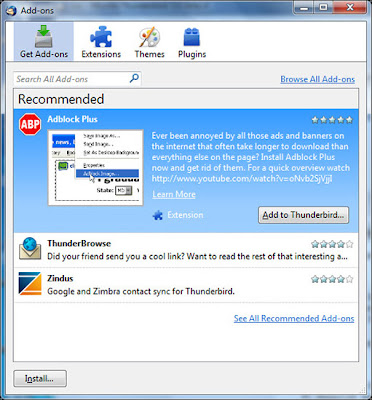
Search now has two interfaces. If you right-click the folder you want to search in, you'll see a dialog that lets you choose things like whether you want to search on the subject line or e-mail contents, and in which folder. This displays hits at the bottom of the same dialog. If you just use the built-in search box at the top, however, you'll see results in a full tab window, with a new set of filters along the left. These let you choose people, folders, and like Google's advanced search options, show of bar graph of message volume over time. It's nice to be able to click on a bar to get messages from that time period.
In fact, search is one area where Thunderbird soundly beats Outlook, which takes too long and doesn't give you as much filtering assistance. Webmail services like Yahoo and Google, however, offer pretty quick, configurable search; and Windows Live Mail actually offers quick, sortable mail search from a box at the top, too. Another helpful Thunderbird feature is Filter Rules, which you can run at mail retrieval to sort messages from certain users or with specified subject text to folders of your choice.
Message summary view lets you select multiple e-mails; you'll see the first few lines of all selected messages in the preview pane below. But Outlook does this one better, with an Autopreview view that shows the first few lines of every message in the inbox.
The new archive feature is somewhere between deleting and keeping a message in your inbox. Just click the Archive button and the message will disappear from your Inbox, but still be accessible if you really need it. But it doesn't offer Auto Archiving like Outlook's.
The Activity Manger window shows you all Thunderbird's interactions with your mail servers and plug-ins. It doesn't really manage, but it gives you a view that could help track down problems.
Tagging is another nice perk, with choices like To Do, Important, and so on, but you can't give them a deadline as you can in Outlook. A one-click way to add to your address book is also a welcome feature—all e-mail addresses in any message's header will have stars next to them, and clicking on the star instantly adds them to your address book.
Thunderbird has good tools for protecting you from annoying e-mails: a junk mail filter that learns based on what you mark as spam, the ability to tie in with your antivirus software to quarantine malware, and phishing warnings. Like Outlook and most other mail readers, it also doesn't download images unless you give the okay.
-pcmag
No comments:
Post a Comment